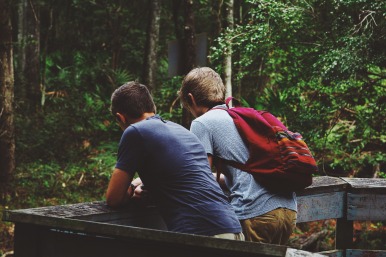
So, you’ve decided to study abroad. It can be overwhelming and confusing to think about everything you need to do, especially if you are not quite sure what to expect once you’ve arrived.
The first piece of advice I can give you is this: take a deep breath. Take one thing at a time; you can do this!
Now that we’re a little bit calmer, let’s move on to the rest of the post.
This past year I had my own study abroad experience. I have compiled what I believe to be some of the biggest things to expect and some advice that I would like to pass on to all of you. Hopefully, this can help relieve some of the stress and worry you might be experiencing.
Let’s start with what to expect:
- THE LANGUAGE BARRIER
 The language barrier is very real. Don’t overlook it, but also don’t focus all your energy on it either.
The language barrier is very real. Don’t overlook it, but also don’t focus all your energy on it either.
Understand that it will take some time to adjust to being completely surrounded by a different language. It will be hard at first but with each day it will get easier.
Be patient with yourself as you adjust to this new environment and remind yourself that this is an important step in reaching your language goals!
Make sure not to hide. You are going abroad and this is part of what you signed up for, so go out and experience it! The more you go out and surround yourself with the language and culture, the more you make yourself speak, the sooner that barrier will begin to disappear.
Don’t be afraid to make mistakes! Mistakes are an important part of learning, and continuing to speak and participate in spite of them will only help you overcome the language barrier that much faster and arrive on the other side with more confidence.
- HOMESICKNESS
Some people experience it more than others, but there will be some point in your time away when you will miss home.
Talk with your family and friends before you leave and decide how you want to communicate with them while you are away. Here’s what I used while abroad:

WhatsApp: I used this one all the time. As long as you have an internet connection you are good to go. I found texting and calling through the app very easy. It is also very easy to set up group chats and share media with your contacts. And it’s free! I highly recommend this app if you are studying abroad.
Skype: I found it very helpful when I really needed to see my friends and family “in person”. At some point in the year, I put a few dollars on my account (video calls are free) so I could make calls to a landline when I really needed to. I also highly recommend this, because it is always nice to be able to actually see those you care about.
Facebook: I used this one a lot like I used the texting part of WhatsApp. Besides its normal features, I often used Facebook to talk to my friends who didn’t have WhatsApp.
Email: I’m guessing this one isn’t used quite as much as it used to be. I definitely didn’t use it as much as the others mentioned above, but I did like the fact that it was easy to write out a longer message and add pictures alongside it. Of course, you can always do this via snail mail, but sometimes it is nice to have the convenience of an email.
 Journaling is also a great way to processing your homesickness. Either pick out
Journaling is also a great way to processing your homesickness. Either pick out
a special one to bring with you or find one once you arrive. Journaling has the ability to help you sort through what you are feeling and experiencing, while helping you work through it. It is also a fantastic way to watch your personal process of studying abroad.
Remember to embrace this new world you have found yourself in. Look up some fun things to do and plan ahead. Go out with friends as well. It will help take your mind off your homesickness, and it will help you get better adjusted to your surroundings; both of which are good things.
Exercising, though not always the most enjoyable thing, will also help. It will release endorphins and help clear your mind. You will also get healthier in the process! Walking outside or simply going outside can make a big difference as well.
- CULTURE SHOCK
Culture shock’s intensity is different for everyone, but it is likely to occur while you are away.
![IMG_0961[1]](https://scribescanvas.files.wordpress.com/2015/12/img_09611.jpg?w=310&h=414) One of the main ways to help with culture shock is to do as much research as you can about the culture of where you’ll be staying. I did this before I left, and so when I arrived I wasn’t overly surprised or confused by what greeted me. I highly recommend doing this. If nothing else, it will help ease the worry and let you be fully excited about your adventure. You’ll have a better idea of what to expect.
One of the main ways to help with culture shock is to do as much research as you can about the culture of where you’ll be staying. I did this before I left, and so when I arrived I wasn’t overly surprised or confused by what greeted me. I highly recommend doing this. If nothing else, it will help ease the worry and let you be fully excited about your adventure. You’ll have a better idea of what to expect.
As with homesickness, it is good to go out and do things either by yourself or with friends. Staying in your room will not help you adjust to the culture and will most likely make the culture shock last longer. Go out and explore your new culture and see what interesting things you can find and learn.
As was the case with homesickness, exercising and going outside will help you process your culture shock. The endorphins will help, you’ll feel healthier and your mind will be clearer.
Most importantly, give yourself time to adjust and be patient with yourself. You’ll have just moved to a new place all by yourself and will most likely not be around anyone you know. That’s okay! It’s part of the experience. Notice when it’s happening and remind yourself that it’s part of the process. This will pass over time.
Another way to deal with culture shock is journaling. It is a great way to document the process, and it will help you work through everything. The reasons are the same as mentioned alongside homesickness.
Next, let’s move on from what to expect to some tips for studying abroad:
- NEW FRIENDS AND NEW EXPERIENCES
When I left home to study abroad, I was scared I wouldn’t make friends. I hadn’t done that well at it the year before. I was nervous but determined that I would make friends. It was one of my main goals for my time abroad. Now that I’m home and looking back on my year with fondness I’m happy to say that I achieved my goal.
 My piece of advice for you regarding making friends is this: just talk to them and invite them to do something. It can be scary at first, but I promise that it will get easier over time. Invite someone you feel like has the potential to be a friend to have a meal with you, or to go out and explore, or simply to watch a movie. Little things like this will help build friendships. Putting yourself out there can be very hard, but the possibility of a friendship makes it worth while.
My piece of advice for you regarding making friends is this: just talk to them and invite them to do something. It can be scary at first, but I promise that it will get easier over time. Invite someone you feel like has the potential to be a friend to have a meal with you, or to go out and explore, or simply to watch a movie. Little things like this will help build friendships. Putting yourself out there can be very hard, but the possibility of a friendship makes it worth while.
I recommend that you say yes to more things than you would have back home. Being abroad is a perfect time to try new things; who knows what you might find a love for.
While I was abroad I tried fencing and ended up thoroughly enjoying it. I learned how to fight with swords and made some amazing friends. If I hadn’t made myself step out of my comfort zone, I never would have had so much fun nor have made so many friends.
Your time abroad is a great time to start fresh. It is a great time to step out of your comfort zone and try new things. It is a time to make new friends and learn new things. It is a fresh start, try your best not to shy away from that.
- MONEY
Before you leave think about how much travel, shopping, etc, you would like to do and plan accordingly. It is helpful to know exactly how much you can spend on everything. This way there will be fewer surprises; you will know ahead of time what you can and can’t do.
Planning ahead will take away a lot of stress later on.
 I also recommend making your plan using both your home currency and the one you will be using (if they are different). This will make it easier when you look at what you have to spend when you are using the new currency. It will also save you a lot of time calculating prices because you won’t have to switch back and forth between two currencies.
I also recommend making your plan using both your home currency and the one you will be using (if they are different). This will make it easier when you look at what you have to spend when you are using the new currency. It will also save you a lot of time calculating prices because you won’t have to switch back and forth between two currencies.
- PACKING
 Leave room in your luggage when you are going over. You will end up buying things while you are abroad and will want to bring them home. So, plan accordingly. Leaving space when you’re packing will allow new things to be packed for the way home without you having to get rid of a lot of the stuff you brought.
Leave room in your luggage when you are going over. You will end up buying things while you are abroad and will want to bring them home. So, plan accordingly. Leaving space when you’re packing will allow new things to be packed for the way home without you having to get rid of a lot of the stuff you brought.
Keep in mind that shipping can get expensive, so over the course of your stay try to keep this in mind. Maybe send things home here and there during your time abroad, or leave stuff you no longer need behind to save weight and room before you return home.
I hope you have found this post helpful and that you have a better idea of what to expect. Just remember that everything you experience is part of the process.
Studying abroad a great experience and opportunity, so try to squeeze out as much “juice” as you can while you’re there.
I’m about to study abroad this summer (literally leaving Saturday), for Austria so I love to read these kind of posts with tips and others’ experiences 🙂
http://pensivepalindrome.com
LikeLiked by 1 person
Have a great time! I’m glad you enjoyed it. Safe travels!
LikeLiked by 1 person
I am glad to find a point on Cultural shock. It’s very true, its intensity varying from person to person. Cultural shock has its pros and cons 🙂
LikeLiked by 1 person
It defiantly does. thanks for reading!
LikeLike
I have live and studied in Japan and my first several months i used body language to make communcation 😀 but it works
LikeLiked by 1 person
That’s a good idea! Body language is a huge part of communication
LikeLiked by 1 person
Pingback: July Update! | Scribe's Canvas
I really enjoyed your post! Thanks for sharing!
LikeLiked by 1 person
I’m glad you liked it! Thanks for stopping by!
LikeLike